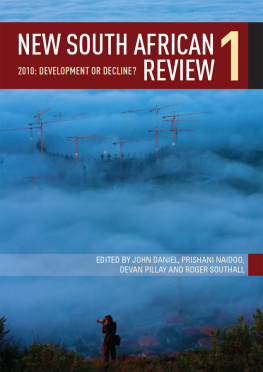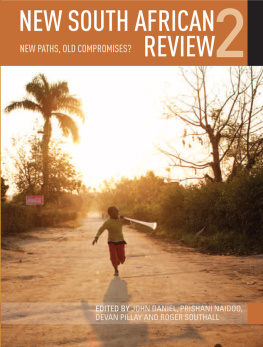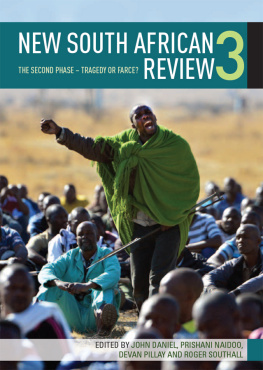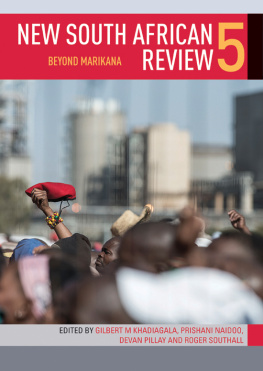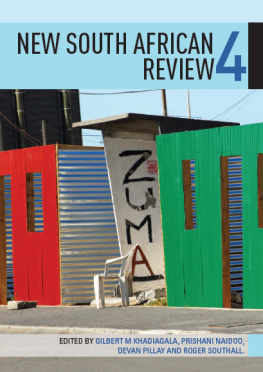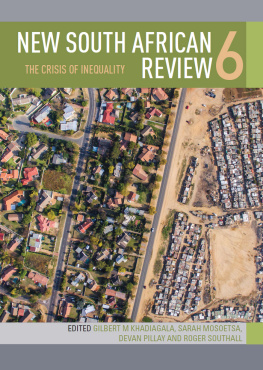NEW SOUTH AFRICAN REVIEW 1
2010: DEVELOPMENT OR DECLINE?
EDITED BY JOHN DANIEL, PRISHANI NAIDOO, DEVAN PILLAY AND ROGER SOUTHALL
Published in South Africa by:
Wits University Press
1 Jan Smuts Avenue
Johannesburg
2001
http://witspress.wits.ac.za
Published edition copyright Wits University Press 2010
Compilation copyright Edition editors 2010
Chapter copyright Individual contributors 2010
First published 2010
ISBN 978-1-86814-516-4 (print)
ISBN 978-1-86814-791-5 (digital)
All rights reserved. No part of this publication may be reproduced, stored in a retrieval system, or transmitted in any form or by any means, electronic, mechanical, photocopying, recording or otherwise, without the written permission of the publisher, except in accordance with the provisions of the Copyright Act, Act 98 of 1978.
Cover image: Africa Media Online Terry February Cape Town Stadium
Project managed by Monica Seeber
Cover design and layout by Hothouse South Africa
Printed and bound by Ultra Litho (Pty) Ltd.
Preface
In producing this, the first edition of the New South African Review , its editors seek to follow that tradition of critical scholarship established so firmly by the seven volumes of the South African Review which appeared in the 1980s and 1990s. They provided invaluable insights into the apartheid states strategies and the popular responses and struggles of those troubled and difficult years. Now, fifteen years into the making of South Africas democracy, the issues which face our society are very different, albeit bearing the heavy imprint of the countrys divided and unequal past. Since 1994, the successive governments headed by ANC presidents Mandela, Mbeki, Motlanthe and Zuma have not only had to assume the normal burdens of state but also to confront massive challenges of transformation across the political, economic, social and international spheres.
In retrospect, there have been considerable achievements. Yet, again, there have been many wrong moves, many downright failures and many disappointments, even though we should, perhaps, be humble enough to recognise that, with its particular legacies, South Africa is not an easy country to govern. Thus it is that the objective of the New South African Review is to provide a forum for reflection upon achievements, problems and challenges, and to stimulate debate between divergent positions held upon a wide range of issues. It is intended to be accessible to a wide range of readership, and to draw upon authors from well beyond academia. Its objective is to be informative, discursive and, at times, to be downright provocative. It is not intended to be an annual review of events, although it will seek to provide contemporary comment, and it will engage with (indeed, seek out) current controversies.
The New South African Review is housed in the Department of Sociology at the University of the Witwatersrand. We should like to acknowledge, with thanks, financial support from the Konrad Adenauer Foundation and from the Faculty Research Committee of the Faculty of Humanities at Wits. Neither of those bodies is responsible for any of the views expressed in any chapters of this volume, but both have kindly provided the material means whereby workshops and editorial meetings have been held, and peer review of all chapters conducted. Without their encouragement and backing this project would never have got going. Our thanks must also go to our authors for having more or less behaved themselves in submitting and revising chapters more or less according to a tight schedule, and for accepting our editorial harrying with a good grace. Finally, we should like to thank Doreen Atkinson, Jackie Cock, Mark Colvin, Simon Dagut, Emily Delap, Bill Freund, Leah Gilbert, Ruth Hall, Catherine Jenkins, Duncan Innes, Don Lindsay, Helene Perold, Maxine Reitzes and Christopher Saunders for making valuable comments upon different chapters in the peer review process.
John Daniel (School of International Training, Durban), Prishani Naidoo, Devan Pillay and Roger Southall (all based at the Department of Sociology, University of the Witwatersrand).
May 2010
INTRODUCTION
South Africa 2010: From short-term success to long-term decline?
Roger Southall
For a decade and a half following the arrival of democracy, South Africa enjoyed its longest period of uninterrupted economic growth since the mid-1960s, the golden age of apartheid. Even if it is going far too far to suggest that the fifteen odd years after 1994 amounted to a second golden age ( from 4.2 per cent in 1996 to 1.4 per cent in 2008 (SAIRR 200809: 92 and 302).
Further, even though the fruits of growth were highly unevenly shared and public service provision in key areas seriously attenuated, the extent of poverty was leavened by a substantial increase in transfer payments made by the state to the old, disabled, unemployed, for child support, and so on. Although these gains left much to be desired, it is nonetheless wise to locate them against the background of South Africas overall economic decline from around 1980 until 1994 and a period of near calamitous collapse during the uncertain years of the political transition. Meanwhile, this extended period of growth was accompanied by South Africas movement from racial authoritarianism to a democracy which, whilst incomplete, has provided a framework for political stability. Compared to the grim picture which the country projected in 1990, South Africa in 2010 is another country. Only a democratic South Africa, and one with a relatively advanced and stable economy, would have won the dubious honour of the right to host soccers World Cup in 2010 (Cornellison below).
Numerous critics have decried these achievements as seriously flawed: economically as failing to provide for socially just and sustainable development; politically by providing for a hollowed out democracy in which the constitution is under constant threat from the ruling African National Congress (ANC); and socially for a marked failure to ground aspirations towards collective welfare in an efficiently functioning state. Indeed, in this volume, we present a series of chapters which query the logic and performance of the present trajectory, outlining variously how its pursuit has led to deindustrialisation (Mohamed), persistent and unremittingly high levels of unemployment (Makgetla), and how it is running up against underlying resource constraints (Pillay, Swilling, Muller). Certainly, it is in the nature of the social sciences to provide critiques of the existing world against the imagination of utopias (even if, as Vale argues below, current state policies discourage such unbounded thinking). However, the role of the social sciences is also to compare existing reality against what might have been, whether for better or for worse. From this perspective, post-apartheid South Africa can lay claim to having been something of a success during the first two decades of democracy. The present outcome was by no means an historical inevitability, and accordingly critics of an imperfect present need to recognise that matters might have turned out a lot worse. Even so, it would seem that the foundations of this success over the short-term are today under threat; that this may be heralding a long-term decline; and that there is serious reason for South Africans to be worried about the direction in which their country is headed. This volume is devoted to exploring key dimensions of this possibility; and this introduction to sketching out its dynamics.


